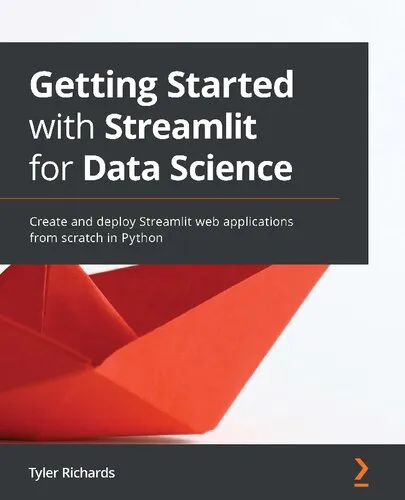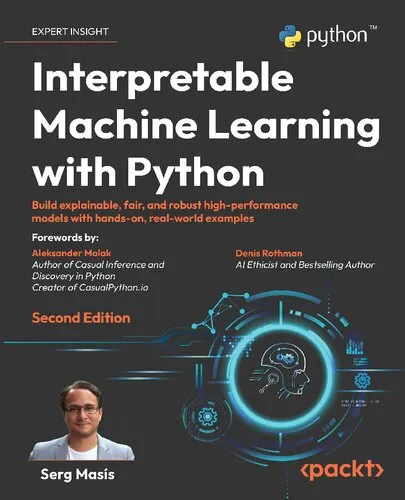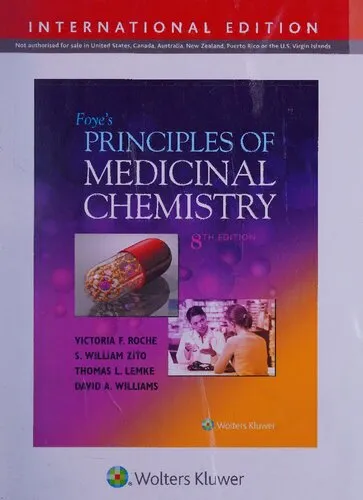Advanced Computer-Assisted Techniques in Drug Discovery (Methods and Principles in Medicinal Chemistry, Vol 3)
4.0
بر اساس نظر کاربران

شما میتونید سوالاتتون در باره کتاب رو از هوش مصنوعیش بعد از ورود بپرسید
هر دانلود یا پرسش از هوش مصنوعی 2 امتیاز لازم دارد، برای بدست آوردن امتیاز رایگان، به صفحه ی راهنمای امتیازات سر بزنید و یک سری کار ارزشمند انجام بدینکتاب های مرتبط:
معرفی کتاب
کتاب "Advanced Computer-Assisted Techniques in Drug Discovery" (جلد ٣ از مجموعه Methods and Principles in Medicinal Chemistry) یکی از آثار تحقیقی برجسته در زمینه شیمی دارویی و استفاده از کامپیوتر جهت کشف داروهای جدید است. این کتاب توسط دکتر Han Van De Waterbeemd نگاشته شده و در راستای تلفیق دانش شیمی، بیولوژی و فناوریهای مدرن به پژوهشگران و متخصصین در این حوزه کمک میکند.
پیشرفتهای سریع در علوم کامپیوتری و شیمی محاسباتی طی چند دهه گذشته، رویکرد علم داروسازی را دگرگون کردهاند. این کتاب به طور خاص بر ابزارها، الگوریتمها، و روشهای پیشرفته دیجیتالی تمرکز دارد که برای شناسایی و طراحی ترکیبات مولکولی به کار گرفته میشوند. این رویکردها به متخصصان شیمی دارویی این امکان را میدهند تا نه تنها بهرهوری فرآیند کشف دارو را افزایش دهند، بلکه هزینهها و زمان توسعه را نیز کاهش دهند.
خلاصهای از کتاب
این کتاب مجموعهای جامع از روشهای کامپیوتری مدرن در کشف دارو را ارائه میدهد، که بهویژه در ارتباط با مدلسازی مولکولی (Molecular Modeling)، شبیهسازیهای دینامیک مولکولی، تحلیلهای QSAR (Quantitative Structure-Activity Relationships) و روشهای Virtual Screening است.
- ارائه مفاهیم اولیه و پیشرفته در طراحی داروهای مبتنی بر ساختار (Structure-Based Drug Design).
- مرور تکنیکهای پیشرفته مانند Docking، شبیهسازی Monte Carlo، و الگوریتمهای Machine Learning در کشف دارو.
- تحلیلی بر استفاده از Big Data و هوش مصنوعی در بهبود پیشبینیهای دارویی.
- مطالعات موردی (Case Studies) برای نشان دادن چگونگی استفاده از اصول تئوریک در پروژههای عملی واقعی.
این کتاب برای مخاطبانی طراحی شده که در زمینههای شیمی دارویی، بیوانفورماتیک، و علوم مرتبط به دنبال درک عمیقتری از ابزارها و تکنولوژیهای نوین در فرآیند کشف و توسعه دارو هستند.
نکات کلیدی
- درک اصول پایه و کاربردهای عملی Computer-Assisted Drug Discovery (CADD)
- تحلیل اصول QSAR و نحوه تأثیر آن بر پیشبینی فعالیت بیولوژیکی مولکولها
- گذر از تکنیکهای کلاسیک به ابزارهای پیشرفته در کشف دارو مانند کاربرد یادگیری عمیق (Deep Learning)
- تطبیق پذیری تکنیکهای شیمی محاسباتی در صنایع پیشرو دارویی
جملات معروف از کتاب
"The integration of computational methods into drug discovery does not replace the experimental approach but enriches and enhances it, leading to higher efficacy and success rates." - Han Van De Waterbeemd
"Data is the cornerstone of modern medicinal chemistry, and its proper analysis is the gateway to innovation." - Han Van De Waterbeemd
چرا این کتاب اهمیت دارد؟
عصر حاضر با تغییرات گسترده فناورانه مواجه است که این تغییرات تقاضا برای راهحلهای سریعتر و کارآمدتر در صنایع مختلف را افزایش داده است. در حیطه شیمی دارویی و کشف دارو، کتاب "Advanced Computer-Assisted Techniques in Drug Discovery" به عنوان مرجعی مهم، کلیدیترین مفاهیم، ابزارها و کاربردهای قابل اجرا در جهان واقعی را برای متخصصان ارائه میکند.
اهمیت اصلی این کتاب در تجمیع موضوعات مختلف زیر یک چتر واحد علمی است و میتواند به عنوان یک مرجع پایه برای دانشجویان تحصیلات تکمیلی، استادان دانشگاه، و متخصصان حرفهای محسوب شود. به علاوه، این کتاب اهمیت ویژهای برای شرکتهای داروسازی و بیوتکنولوژی دارد که به دنبال بهرهبرداری از فناوریهای مدرن برای تولید داروهای نوین هستند.
در نهایت، ترکیب بینقص نظریه، ابزارهای عملی، و دیدگاه آیندهنگر نویسنده، این اثر را برای هر پژوهشگری که به دنبال گشودن افقهای جدید در شیمی دارویی و کشف دارو است، ضروری میسازد.
Introduction to Advanced Computer-Assisted Techniques in Drug Discovery
Advanced Computer-Assisted Techniques in Drug Discovery (Methods and Principles in Medicinal Chemistry, Vol 3), authored by Han Van De Waterbeemd, is a comprehensive guide exploring the revolutionary role of computational tools in modern drug development. With an era-defining approach, the book bridges interdisciplinary fields such as chemistry, biology, and informatics, offering researchers, scientists, and academics a roadmap to understanding and applying contemporary computer-assisted methodologies in medicinal chemistry.
As the pharmaceutical landscape evolves, leveraging computational power is not just optional but a necessity. This book delves deep into the theoretical and practical frameworks required for researchers and professionals to harness state-of-the-art computational techniques for discovering and optimizing drug candidates. It provides readers with a robust exploration of core concepts, groundbreaking technologies, and real-world applications that shape the future of drug discovery.
Written in a meticulously structured format, this volume is a part of the acclaimed Methods and Principles in Medicinal Chemistry series, renowned for its detailed treatment of advanced scientific methodologies. Whether you are already engaged in computational drug discovery or planning to venture into this transformative field, this book serves as an indispensable guide.
Summary of the Book
The book presents a nuanced discussion of diverse aspects of computational drug discovery, structured to cater to learners at multiple levels. It begins with an introduction to the principles of computer-aided drug design (CADD) and its practical relevance in pharmaceutical research. From there, the narrative expands to include high-throughput screening, predictive modeling, molecular docking, and the role of artificial intelligence and machine learning in drug design. Advanced topics are also addressed, such as virtual combinatorial library generation and multi-parameter optimization.
A significant portion of the book is devoted to exploring how computational methods can be effectively validated and integrated with experimental strategies. This creates a robust and iterative framework for generating insights that are both scientifically accurate and practically feasible. By addressing common challenges and offering expert solutions, the book equips readers with a well-rounded perspective on leveraging computational power in drug discovery.
The book’s goal is to demystify the complexity of computational techniques while highlighting their utility and real-world applications. It achieves this by coupling foundational theories with visualized examples and case studies that demonstrate their relevance in the pharmaceutical pipeline.
Key Takeaways
- Understanding the principles and fundamentals of computer-aided drug design (CADD).
- Gaining insights into modern high-throughput screening methodologies.
- Mastering techniques like molecular docking, predictive modeling, and QSAR (Quantitative Structure-Activity Relationship).
- Learning how artificial intelligence and machine learning can transform drug development workflows.
- Exploring validation strategies that bridge computational and experimental methods.
- Practical advice on overcoming computational challenges to achieve tangible results.
Famous Quotes from the Book
"Drug discovery is no longer the domain of serendipity. With computational methods, science has the opportunity to design molecules with unprecedented precision."
"The confluence of chemistry and artificial intelligence marks the dawn of a new era in medicinal science—one where imagination meets computational reality."
Why This Book Matters
The importance of Advanced Computer-Assisted Techniques in Drug Discovery lies in its ability to capture and convey the disruptive potential of computational methods in pharmaceutical research. The book fills a critical knowledge gap by providing detailed guidance on both the theoretical underpinnings and practical applications of computer-assisted drug discovery.
In a time when drug development faces immense cost, time, and efficacy challenges, computational methodologies offer a way to accelerate discovery, improve accuracy, and reduce experimental overhead. This book empowers researchers with the tools they need to remain at the forefront of innovation, helping them contribute to breakthroughs that address global health needs.
Furthermore, by fostering an understanding of AI and machine learning integration, the book prepares its audience for the rapidly evolving future of drug discovery. Its emphasis on scalable, iterative methods ensures that readers can stay ahead in a competitive research environment while maximizing the use of computational advancements in their work.
دانلود رایگان مستقیم
شما میتونید سوالاتتون در باره کتاب رو از هوش مصنوعیش بعد از ورود بپرسید
دسترسی به کتابها از طریق پلتفرمهای قانونی و کتابخانههای عمومی نه تنها از حقوق نویسندگان و ناشران حمایت میکند، بلکه به پایداری فرهنگ کتابخوانی نیز کمک میرساند. پیش از دانلود، لحظهای به بررسی این گزینهها فکر کنید.
این کتاب رو در پلتفرم های دیگه ببینید
WorldCat به شما کمک میکنه تا کتاب ها رو در کتابخانه های سراسر دنیا پیدا کنید
امتیازها، نظرات تخصصی و صحبت ها درباره کتاب را در Goodreads ببینید
کتابهای کمیاب یا دست دوم را در AbeBooks پیدا کنید و بخرید
1276
بازدید4.0
امتیاز0
نظر98%
رضایتنظرات:
4.0
بر اساس 0 نظر کاربران
Questions & Answers
Ask questions about this book or help others by answering
No questions yet. Be the first to ask!






![The Ultimate iOS Interview Playbook: Conquer Swift, frameworks, design patterns, and app architecture [Team-IRA]](https://s3.refhub.ir/images/thumb/The_Ultimate_iOS_Interview_Playbook__Conquer__29925.webp)







